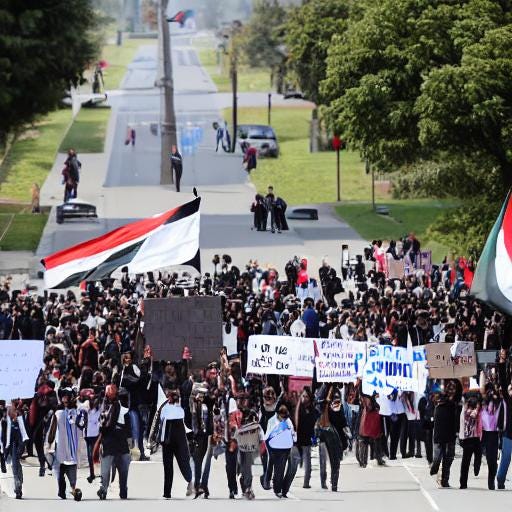Suppose we didn’t know why there are ructions at university campuses. Not suppose that they were having a food strike (which we did at school, and which I wrote about here), but let’s suppose we just didn’t know what the trouble was. That we’d never heard of Israel, or Gaza, or sliced white bread. What, then, would you think about what’s happening at Yale, and Columbia, and elsewhere at this time?
Go ahead: you are hereby freed from the constraints of having to judge the issue itself. You have no responsibility to judge the merits of the occupations and the encampments and the sit-ins. What is your judgment of how they are being dealt with?
Is it that protest is futile, so that to protest anything is wrong? What, then, if you received £5 less in your change than you ought to? Is it worth protesting then? Or should you simply accept that short-changing is part of life and you must acquiesce in it? I was short-changed five cents this week; I protested, and got my five cents. It was very amicable and an apology was given. It was only five cents, but they were mine, not the shop’s. Sometimes justice is easy to discern. No police were called.
Is the decision to call the police dependent on the severity of the protest, or is it dependent on other factors, like the loudness of the chanting? The vehemence of the violence? The damage to tender young shoots of grass on lawns? The loss in stock market value of whatever loses stock market value when such protests take place?
What about the decision to arrest people who use nothing but their voice to protest (aside from the unfortunate damage to pristine lawns)? Is it justifiable to arrest people for voicing their protest, or for marching? Or for just being there? For voicing their protest in the form of silent placards? Maybe we should just protest and not say why we protest. That way, no one is embarrassed. But then people would ask, would they not, “What are you protesting about?” Then, if they were told what the people are protesting about, that should be the point at which a criminal offence is committed. Would that make more sense? In Russia, they hold up pieces of white paper with nothing on, and still get arrested.
A young Jew was arrested in the UK for displaying a placard that said Jews Against Genocide. When that resulted in him being taken in by the police, he asked, “Would it have been more acceptable if the placard had read Jews In Favour Of Genocide?” to which the police officers had no answer but to treat him even more roughly.
If the students of America, and elsewhere, it must be added, are slowly, but surely, realising the inane conundrum they are living through (and growing into), the irony lies in the fact that they are being constrained in the expression of their dismay and disgust with powers that they cannot otherwise hope to influence, on a matter of conscience, by law enforcement agencies who themselves have no answer to the logic arraigned against them by those they arrest for offences that have, in many cases, not been committed or that do not even exist.
And, it is at that point that the debate between the educator and the educated ceases to be limited to the educational institution, for it is now a debate that implicates us all. Not all of us are protesters, but all of us do protest at some time or another, as my small change dispute demonstrates. And not all of us evoke protest, but the divide is opening up wide between those who aspire to a position whereby insouciance towards others is a core element of that position, and those who aspire to the position whereby protest against the insouciant is, for them, a core value. In the 1990s, clothing trends between the generations narrowed to the point where a success story arose in malls around the globe: The Gap. Sweatshirts aside, and 30 years on, a new Gap is establishing itself, and it will not be closed with just a drawstring.
It is the agencies called upon to restrain the protests that are failing to understand their complicity as tools of the authors of circumstances which youth has banded together to oppose. The agencies of law enforcement comply without question on an, at most, questionable legal basis to perform, not the will, but the whim of established authority, under laws cast so widely that you’re guilty if we say so. Laws for the facilitation of elimination. Some comply with the command to enforce with a reticence that, at least, is creditable. Others do so with a venom that recalls the Nuremberg defence of I was only following orders. Aye, some may just follow orders, and others champ at the bit, waiting for the orders, adherence to which they will later brush from themselves, as Pilate washed his hands after the flogging.
And that is why the cause of the protest is now no longer of core relevance. It is the reaction of the law enforcers that should concern, not just the college young, but the broad gamut of our societies. Our right to remain silent is becoming an obligation.





Great post, Graham. You've said it all. Columbia and Yale administrators are not only embarrassing themselves, they are embarrassing the whole Country. At least in the 1960's, when I was in college they had the decency to ignore our peaceful protests. Of course I was in California (and in my 30's) that might have made a difference.